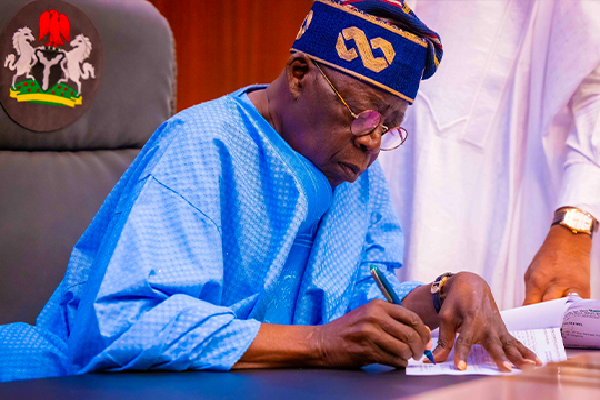
Amid concerns around the high cost of governance, the 48 ministerial nominees whose names were sent to the Senate for clearance by President Bola Tinubu and about 560 commissioners-designates in 27 states of the federation may cost the country about N23.4billion in salaries.
According to Punch, the figure was based on the recommended salaries and allowances for ministers and commissioners by the Revenue Mobilization and Fiscal Allocation Commission.
Aside from the annual basic salaries, the figure includes such as allowances for accommodation (200 per cent of basic salary), domestic staff (75 per cent of basic salary), utilities (30 per cent of basic salary), house maintenance (five per cent of basic salary), wardrobe (25 per cent of basic salary), furniture (300 per cent of basic salary), motor vehicle fuelling allowance (75 per cent of basic salary), and entertainment allowance (45 per cent of basic salary), among others.
The furniture allowance is paid once every four years.
Tinubu has set the record for the highest number of ministerial nominees in Nigeria’s Fourth Republic (1999 to date), with 48, which experts said would likely worsen the high governance costs.
The President’s nominees topped the 42 appointed by his predecessor, Muhammadu Buhari, in 2019 by five more persons.
A week ago, Tinubu nominated 28 persons to be cleared by the Senate as ministers. On Wednesday, the President sent another list of 19 nominees, making 47 potential cabinet members.
However, on Friday, Tinubu withdrew the nomination of Maryam Shetty as a ministerial nominee from Kano State and replaced her with Dr Mariya Mahmoud Bunkure, also from Kano State.
He also added the name of Festus Keyamo, a Senior Advocate of Nigeria from Delta State, as a nominee for screening.
Buhari named 36 ministers in his first term, while the number increased to 42 during his second term.
Former President Goodluck Jonathan in 2011 named 33 nominees to be ministers in his cabinet, including nine from the Umar Yar’Adua administration.
In 2007, Yar’Adua named a 39-member cabinet comprising 32 men and seven women.
Former President Olusegun Obasanjo initially named 42 ministers in 1999 but reviewed his cabinet to reduce the number of ministries and ministers to 27 and 40, respectively, before he left office in 2007.
Despite calls to reduce the cost of governance, Tinubu has now surpassed Obasanjo, Yar’Adua, Jonathan and Buhari to name 48 would-be ministers, setting a new record since the country returned to democracy 24 years ago.
Based on the RMAFC template, each minister is expected to earn N650,136.65 monthly or N7,801,640 annually or N31,206,560 in four years.
